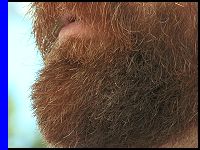
On October 4, 1935, under the heading “Mysteries Of The Beard”, The Times of London printed the following letter to the editor.
Sir,– What reader of The Times can tell us the mysteries of the beard?
Why are some races bearded and other (sic) almost beardless? Why can some men grow heavy moustaches and chin beards (goatees, imperials, and Van Dykes), but hardly any hair on the cheeks? Also, how account for the different dispositions of hair on men’s faces? Why can some men grow beards 5 ft. long and other men beards only 2 in. long? Why do the moustache and the beard usually turn grey before the hair does (like the muzzles of old dogs)? Why are the colours of the hair and the beard different? Why are many heavily bearded men bald and many men with heavy heads of hair scantily bearded? Why does a bearded man seldom or never lose his beard through baldness? Why does a man twirl his moustache or fondle his beard? Finally, why is a beard? (Don’t reply facetiously.)
Yours very truly,
CHARLES HOOPER.
Coeur d’Alene, Idaho, U.S.A., Sept. 19
Mr. Hooper certainly asked a lot of questions. His letter provoked an editorial reply from The Times, a follow-up article, and additional letters to the editor.
Face fittings
The editorial reply that accompanied Mr. Hooper’s letter was titled Face Fittings. It starts off with:
In a letter at the foot of this column a correspondent asks a great many questions which…will probably remain unanswered. The reader who is no specialist in face fittings can but tear his hair with bewilderment at the difficulties opened up by this ardent and pertinacious seeker after truth. To one question only will plain common sense supply the answer; and that is, oddly, the very question which the inquirer fears may be treated with levity. To “Why is a beard?” there can be, for serious-minded men, but one answer. It is the fundamental, the elemental, truth which is the answer also to “Why is a mouse when it spins?” The answer is, “Because the higher you go the fewer” — with its inseparable complementary truth that the lower you go the more.
Then the editors touch lightly upon the topics of beards and baldness, beards and ethnology, and the graying of the beard and the hair on the head. But they do not shed appreciable light on any of these issues.
The editorial continues:
The general reader, it may be feared, will brush Mr. Hooper’s questions aside as of purely antiquarian interest. Beards are so few nowadays that only lovers of the olde-world and the romantic can have any feeling for them. A man must have lived in the beard age — between the Crimean War, that is, and the Boer War — to have proper appreciation of the various emotional and aesthetic effects of the beard (including whiskers). Beard-consciousness, perhaps, began with the puzzle of Aaron’s beard in the Psalms; was it the precious ointment or was it the beard that went down to the skirts of his clothing? The mere doubt was enough to leave on the childish mind a noble vision of a beard, as our correspondent would say, at least five feet long. Once beards had
become a fact in consciousness, there were all sorts of things to notice. There was the way in which the owner stroked or otherwise handled it, whether with imposing deliberation that left a yet glossier surface than before, or with nervous fingers plucking at ragged tufts. Not a doubt of it, a man who could grow a good beard and knew how to use it had a great power over his fellow-men, and (though it seems very strange to-day) over the beardless sex.
After a brief discussion of some of the challenges posed by eating with a beard, the editorial concludes with:
It seems sad that the lessons learned in youth should have been rendered useless by fashion; and that the young of this age should know nothing of a source of fun and of experience enjoyed to the full by theirelders.
Re: Mysteries of the beard
On October 21, 1935 the following letter to the editor appeared in
The Times of London.
Sir,–With all humility I would suggest that the delightful and witty leading article on “Face Fittings” did not quite supply the food for which your correspondent in Idaho was hungering.
It is a serious subject and I feel that I can enlighten him on one point: I can tell him why a beard is. A man with a bald face is at a disadvantage: he is obliged to resort to bluff and boastfulness to maintain his masculine authority.
I am of the Van Dyck persuasion. Since I forswore beardlessness two years ago I have received on all sides and from both sexes such an astonishing increase of courtesy and respect that I have become convinced of the propriety of beards. Shakespeare has, I think, much to say about “beardless boys,” and it may be observed that, in his day, when beards were much cultivated and cherished, men were of a frank, courageous, and imaginative sort. Women of to-day, working often side by side with men, profess to dislike beards. I can tell them (for they can give no reason for this) that this is because they fear the authority that goes with a beard; secretly (and naturally, of course) they have a greater respect for the bearded male.
Modesty, not apprehension, prompts me to adopt a nom de plume.
I am, therefore, Sir, your obedient servant,
NOW BEARDED.
More of the response to Mr. Hooper’s letter may be added here in the future.
